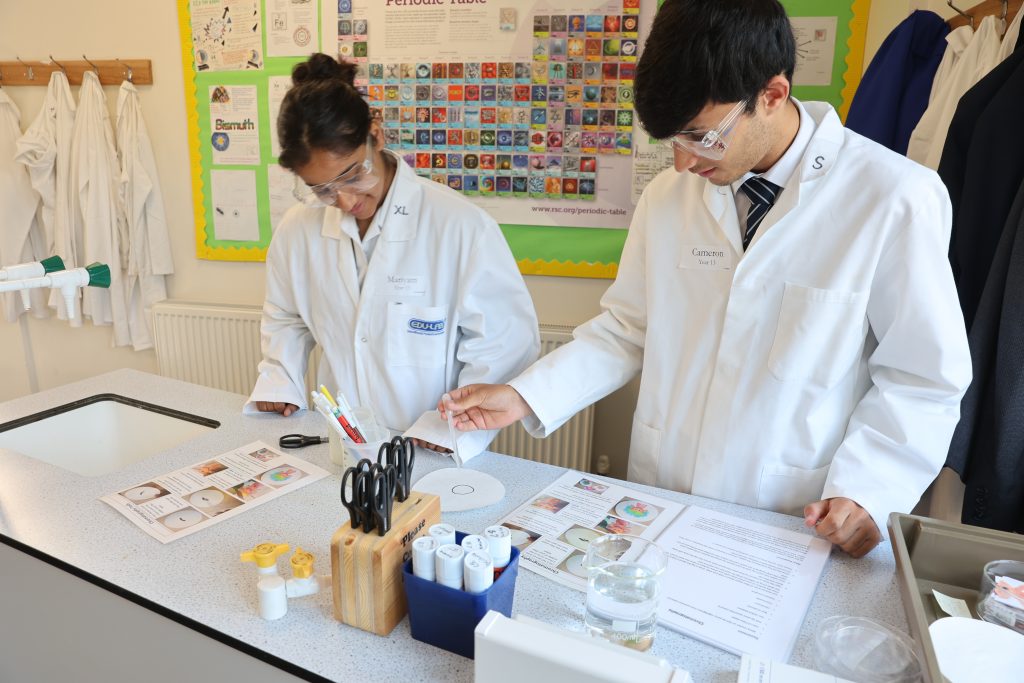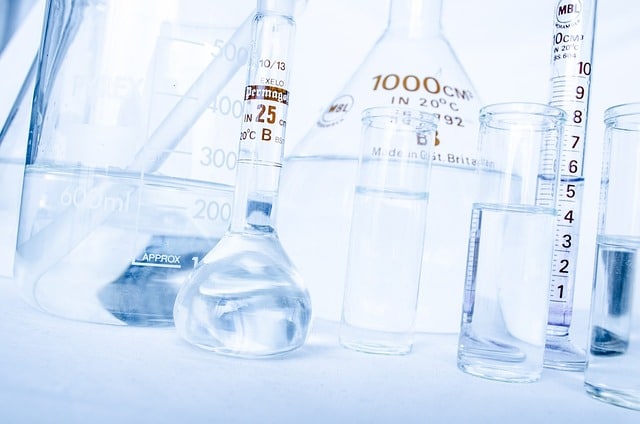Chemistry at Forest School
Head of Department: Mr A Barlow ab@forest.org.uk
“Speaking one day with Monsieur de Buffon on the present ardor of chemical enquiry, he affected to consider chemistry but as cookery, and to place the toils of the laboratory on a footing with those of the kitchen. I think it on the contrary among the most useful of sciences, and big with future discoveries for the utility and safety of the human race.” Those words were written in a letter from Thomas Jefferson, the third President of the United States of America, to Reverend James Madison in 1788. Over two hundred years later, Chemistry remains a core scientific discipline. It can benefit and revolutionise and has the power to explain and to inspire. Chemists invest their time on a daily basis to ensure that the items of food we pick off the shelves are as nutritious and safe as possible, the energy we generate is as clean as it can be and clothes that we wear are as durable as we can make them.
Chemistry is sometimes called the “central science” as it has overlap with and aids the understanding of both Biology and Physics. At Forest, Chemistry is also a very practical subject where students will learn how to plan, carry out and analyse the results of their own experiments. The transferrable skills of analysis, collaboration, critical thinking, and problem solving are extremely useful in many fields and can all be picked up in the study of Chemistry, benefitting the individual whatever they go on to do later in life.
The Chemistry curriculum at Forest allows students to experience a general introduction to the main branches of Chemistry. Students will have access to fully resourced science laboratories and be given opportunities to enrich their classroom learning with opportunities both within and beyond the specification. Students will be fully supported by the Chemistry Department along their journey from Year 9 to Year 13, with regular support clinics and intervention.
Our rich curriculum includes:
- Science Week activities
- ‘Chemistry in Action’ lectures
- The Royal Society of Chemistry Olympiad
- The Lower Sixth Cambridge Chemistry Challenge
- The Lower Sixth School’s Analyst Competition
- Academic stretch sessions for sixth form students applying for scientifically rigorous university courses
GCSE and A-level Overview
The Edexcel IGCSE or IGCSE Double Award Science in Chemistry qualification enables students to:
- Students will gain surface and some deeper understanding organic, inorganic and physical chemistry
- Organic: students will learn about crude oil as a natural resource and be introduced to some of the various homologous series of chemical compounds
- Inorganic: students will learn about acid-base reactions, the reactions of metals and redox chemistry
- Physical: students will learn about the kinetics of equations, equilibria and bonding
- Students will be able to plan experiments, analyse problems, interpret the impact of reaction conditions on a reaction, and apply chemical knowledge to unseen investigations.
- They will learn how to apply mathematical skills to ‘real world’ contexts in order to investigate relationships.
- Although there is no formal practical assessment at GCSE; students will carry out experimental work on a number of ‘core practical’s’ to develop their experimental knowledge and practical skills.
The OCR A Level in Chemistry qualification enables students to:
- Students will learn about the scientific models and explanations behind the chemical reactions and principles which they have previously studied
- Students will be able to justify experimental methods, suggesting modifications to improve validity.
- Students will apply mathematical skills from GCSE and beyond to draw conclusions and analyse experimental data (this forms a much larger part of the course than it did at GCSE and we advise that students who are looking to take Chemistry at A level are mathematically confident.
- Practical competency will be assessed in the Practical Endorsement; a separate certificate from the A Level itself.
Assessment at GCSE and A-level
GCSE:
- IGCSE Chemistry = two written examinations (Paper 1 and 2) – 120-minute (110 marks) exam and one 75-minute (70 marks) exam. Students will gain one GCSE in Chemistry.
- IGCSE Double Award Science = three written examinations (Biology, Chemistry and Physics) – 120-minute (110 marks – 33.33% per exam). Students will gain two GCSEs in Science.
A Level:
- Paper 1 -Inorganic and Physical Chemistry: 100 marks, 2 hour 15 minutes, written paper (37% of the total grade).
- Paper 2 – Organic Chemistry: 100 marks, 2 hour 15 minutes, written paper (37% of the total grade).
- Paper 3 – Unified Chemistry: 70 marks, 1 hour 30 minutes, written paper (26% of the total grade).
- Students will also be assessed on their practical competency in the Practical Endorsement in Chemistry, which is a separate certificate from the A Level grade.
How can Chemistry change the world?
Nobel prize winning chemist Linus Pauling (one of only four people to win two Nobel prizes) once said:
“I feel sorry for people who don’t understand anything about Chemistry. They are missing an important source of happiness!”
Chemists have the power to understand and to change the World. This can be on a small scale, such as knowing the best conditions to make a comforting hot chocolate, or a large scale such as working to solve the World’s energy crisis.



